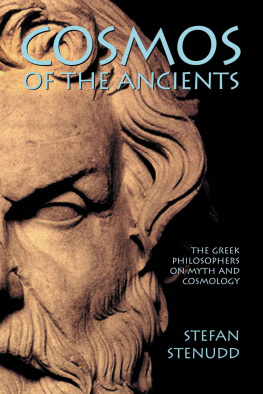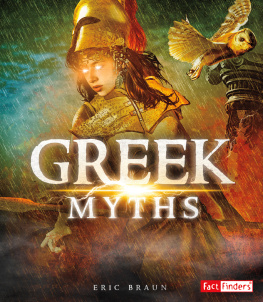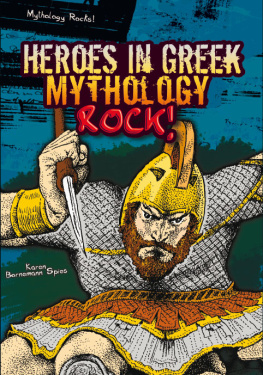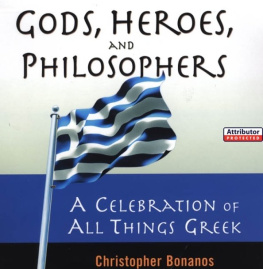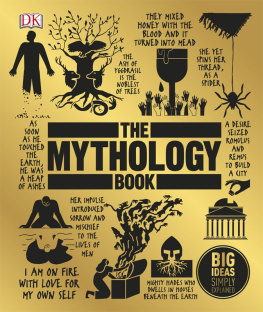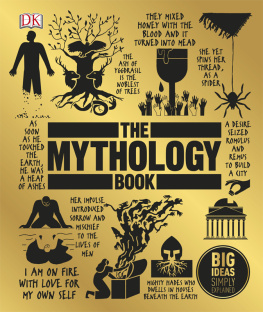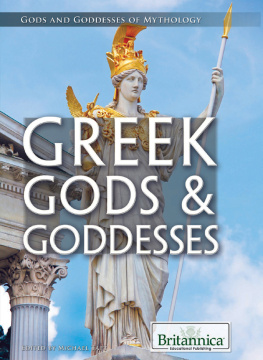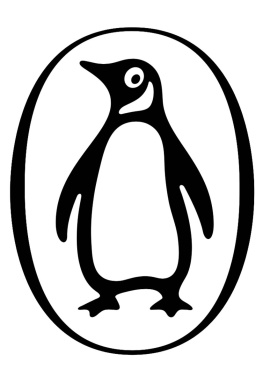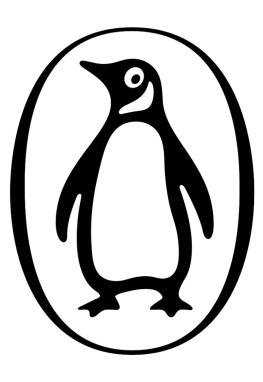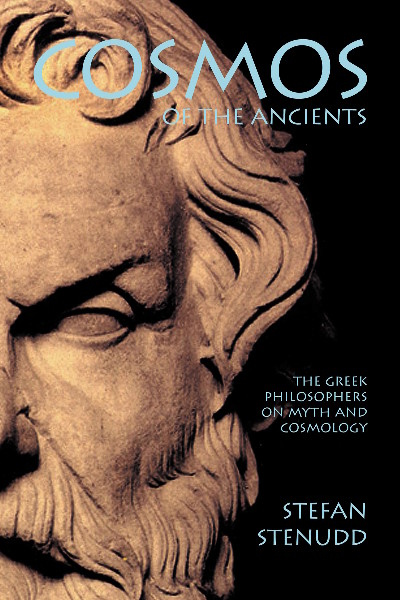
Cosmos ofthe Ancients
The Greek Philosophers onMyth and Cosmology
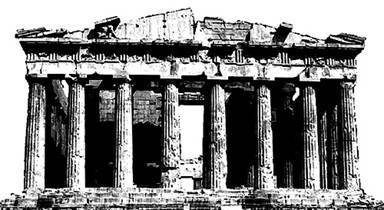
Stefan Stenudd
Stefan Stenudd is a Swedish author, historian of ideas, artist, and a longtime instructorin the peaceful martial art aikido. He has published a number of books inSweden as well as English, both fiction and non-fiction.
Among the latter is an interpretation ofthe Chinese classic Tao Te Ching and one of the Japanese samurai classicGo Rin no Sho by Miyamoto Musashi. His novels explore existentialsubjects from Stone Age drama to science fiction, but lately stay more and morefocused on the present. He has also written some plays for the stage and thescreen. In the history of ideas he studies the thought patterns of creationmyths, as well as Aristotles Poetics. He has his own extensive website:
www.stenudd.com
Also by Stefan Stenudd:
Tao Te Ching. The Taoism of Lao TzuExplained, 2011.
Life Energy Encyclopedia, 2009.
Aikido Principles, 2008.
Qi. Increase Your Life Energy, 2008.
Attacks in Aikido, 2008.
Aikibatto. Sword Exercises for AikidoStudents, 2007.
Your Health in Your Horoscope. Introductionto Medical Astrology, 2009.
Fiction:
Alls End, 2007.
Murder, 2006.
Cover :Antisthenes. Roman copy of a Greek marble original from around 300 BC. Frontispiece:Parthenon, the temple of Athena on Acropolis in Athens, from the 5thcentury BC.
Stefan Stenudd: Cosmos of the Ancients.The Greek Philosophers on Myth and Cosmology
Copyright Stefan Stenudd, 2007, 2011.
Cover and book design by the author.
All rights reserved.
ISBN 978-91-7894-045-5
Publisher: Arriba, Malm, Sweden,info@arriba.se, www.arriba.se
Contents
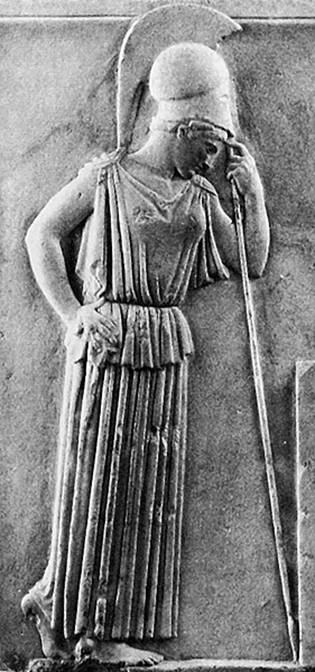
Above: Mourning Athena. Marble relief,c. 470 BC.
Foreword
Although this bookis about philosophers, its objective is not philosophy. I am mainly interestedin the patterns of thought, as they appear in religion and its myths. So, I usethe Greek philosophers to explore how the human mind relates to religiousbeliefs: does it really believe in them?
Modern society isquite secular, and many among us have little faith in whatever religion oursociety supports. Still, we take for granted that in past cultures thepopulation was homogenous in a strong belief in their gods and the myths aboutthem. We tend to make the same assumption about any society outside of our own,and any religion except the one of our own tradition.
That is hasty,probably also prejudiced. Why would we not start by expecting other cultures tobe able the same doubts?
The Greekphilosophers lived in a society that cherished the myths about its gods,celebrated them and erected temples to their honor. It is taken for grantedthat the Greeks of Antiquity believed in their gods and the myths about them,as if their minds were unable of anything else. Now, the minds of thephilosophers are accessible to us in the form of their words saved forposterity. Their thoughts can be traced, as for how they related to the godsworshiped by the society surrounding them.
Those wereexcellent minds, of course. Maybe they had little in common with the thoughtsgoing through the heads of the average citizens at that time. Still, there is alimit to how much different they could have been. What was conceivable to thephilosophers must at least have been perceivable to other Greeks. Otherwisetheir words would neither have been understood nor recorded. And they were noalien beings.
So, what the Greekphilosophers were thinking was possible for anyone in their society to think.If they doubted the existence of the gods or the accuracy of the myths, thenthat doubt was recognizable to other Greeks, and quite possibly present intheir minds as well.
As can be seen inthis book, the doubt was definitely there just about everywhere.
That is reasonenough to start by assuming the same doubt in every culture and every era. Wehave our religions, our gods and myths. Even though we may cherish and praisethem, we also have our doubts about them. I would say that it's not a questionof whether the human mind is capable of doubt the question is really if weare at all able not to doubt. I doubt it.
Stefan Stenudd
April, 2007
Introduction
Living Myth
It is a rare thingbeing able to study a setting of living myth, with numerous contemporarycommentators to it, people writing in that setting at the very time of themyths flourishing. Thereby, several important questions can be answered, suchas: What roles do the myths play in their life? Do they regard the myths asperfectly accurate recounts of past events? Do they see the myths as trustworthyguides in the present? How do they interpret and understand them?
Of course, thisstudy can be done at least orally in a number of societies around the worldwhere the myths are still integrated with social life and not marginalized ordefeated by cosmologies of other kinds. On the other hand, in such societies for example, the many remaining hunter-gatherer cultures the localcommentators are extremely difficult for the outside observer to understandwith any certainty. It is also possible that their language contains few termsfor analyzing their traditions in any alternative way.
Language andthought are bound to the framework of the society they belong to. This isparticularly true about cultures without writing, which is the tool foranalytical discussion continued through time. Oral tradition can keepimpressive amounts of information relatively intact for generations, but withlittle abstraction or theoretical reasoning. Stories are easily kept and repeated, butnot speculations about them.
Even if theirlanguage and minds are apt to it, whats to guarantee that its not lost in translation?It has proven difficult enough for outside observers to digest local myths andcosmologies. To follow local discussions on their objective value and accuracy,if such conversations are at all possible, would be quite complex.
Already to find atrustworthy local source is no easy matter. The brothers Villas Boas spent asmuch as 25 years with the Xingu Indians in Brazil. Still, they confessed tothis problem:
One of the mostdifficult things in obtaining this kind of data is to find the best informant.An Indian who speaks our language well and who readily offers to tell usstories or reveal information is precisely the least trustworthy for thispurpose. True informants never come forward on their own, they speak only theirown language, and when they are questioned, they even draw back. Furthermore,there are never more than one or two true trustees of the spiritual culture ineach village.
Even if the peoplein question is as willing as ever to share its thoughts, and the listener isall ears, problems appear. French anthropologist Marcel Griaule was by thetribe elders allowed an introduction to the Dogon peoples cosmology. Histeacher was Ogotemmli, one of the elders, who estimated that it would takeyears to complete the teaching. On one of those lectures, Griaule reacted to aninconsistency in the cosmological structure described. Ogotemmli had told himabout a small celestial surface, which had more animals than there couldpossibly be room for. Ogotemmli was quick to reply:

